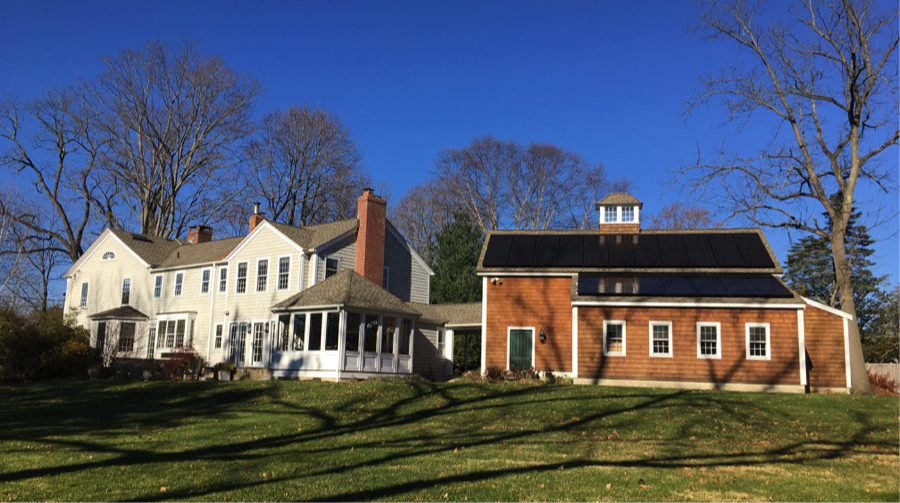More and more homeowners are seeing solar power as an excellent way to save money and protect the environment. In CT alone there are more than 24,000 residential solar panel systems. Many homeowners across CT, New England, and the country, however, still have questions about solar. Here are answers to some of the most frequently asked questions that we receive here at All Green it Solar.
How Much Does a Residential Solar Panel System Cost?
The total costs will vary per household depending on the type and size of system you install. Government incentives, however, help make the entire project very affordable. The first incentive to consider is the thirty percent federal investment tax credit (ITC) for solar energy systems. It reduces your total tax bill by thirty percent of the cost of the solar power system. This incentive will be available at 30 percent through 2019, and then the percentages will start to be reduced through 2023.
The CT Green Bank offers incentives that will help offset the costs of installing a residential solar panel system. The Residential Solar Investment Program provides a rebate of $0.46 per watt of solar installed (up to 10kW PTC) from 10 to 20kW PTC and additional $0.40/watt. Therefore a 7.5 kW PTC (or 7,500 Watt PTC) system would be calculated at 7,500 * 0.463, equaling an estimated $3,473 rebate, as an upfront cost reduction paid to your contractor when your system is complete. Additionally the Energy Conservation Loan Program provides eligible families with zero or low interest loans on solar arrays.
How Much Will Solar Save Me?
Residential photovoltaic systems not only reduce electricity bills, they can also provide long-term savings and increase the resale value of your home. The exact electricity savings for Connecticut homes will depend on the home owers consumption and the size of your PV Solar system.Connecticut has some of the highest electricity rates in the country. By installing solar you can significantly reduce, or even eliminate, this cost. Meaning that you will mitigate future utility rate increases.
Most homeowners see a $5,911 resale value increase per installed kilowatt, as noted by the U.S. Green Building Council (USGBC).That means if you install a 3.1 kilowatt system, you could improve your home’s resale value by nearly $18,000.
Solar panels on the roof also provide protection from the harsh Connecticut weather. This can help extend the lifespan of your shingles. You’ll also receive efficiency benefits as the panels block sun from beating down on your roof. This keeps the house cooler on hot days and reduces your air conditioning demands.
What are the Environmental Benefits?
Solar power is one of the cleanest alternative energy solutions. The most significant environmental impacts of going solar will be the reduction of carbon emissions. Electricity production is responsible for a large percentage of these emissions. By going solar you’re doing your part to reduce the amount of carbon dioxide released into the environment. You’ll also be supporting jobs in alternative energy.
How Does a Residential Solar Panel System Work Exactly?
Solar panels collect sunlight and generate DC electricity. The DC electricity is then converted to AC electricity using an inverter. The solar cells, called photovoltaic or PV cells are the primary component of solar panels. When installing the system the utility will switch out your meter with a bi-directional meter. It will log the kWh’s when using electricity from the grid. When the solar panel system is producing more electricity than you’re using, the meter will log the clean kWh’s produced. When this happens the utility will credit your electricity bill for the amount of kWh’s that you sent back.
One of the critical benefits to going solar is the ability to avoid Connecticut utility rate increases. When you have a solar array installed most, or all, of your electricity, will be generated by the solar panels.
Do Solar Panels Need to Go On My Roof?
Not necessarily. For properties with ample land there are also flat ground-mounted panel systems. And there are building integrated solar modules that mimic slate roof shingles. All Green it Solar provides all three options.
How Long Will The Solar Array Last?
Most solar panel systems last between twenty five and thirty years, but can go longer before output begins to decrease. At Go Green it Solar we provide comprehensive warranties on all of the products that we sell. Like any product, high quality equipment will always perform better and last longer.
What Happens in a Power Outage?
When the grid goes down so does your solar power system. The main reason for this is safety. If utility crews are working on the lines to restore power during an outage, and your system is sending power back to the grid, this poses a big safety issue. You can, however, maintain power to the house while the grid is down by installing a battery storage system. These systems act as a generator by storing excess power from your solar array. You can tap that power during outages. Unlike gas or propane generators, battery storage systems operate with no emissions and they are silent. This technology is available through All Green it Solar.
There is a lot of upside to installing residential solar panels. Government incentives make the systems very affordable. Using an alternative to the utility can help you hedge against future Connecticut utility rate increases and provide significant electricity savings. And you’ll be doing your part in reducing harmful carbon emissions from the environment. All Green it Solar employs experienced installers and we provide only high quality equipment, so you know the job will be done right.

